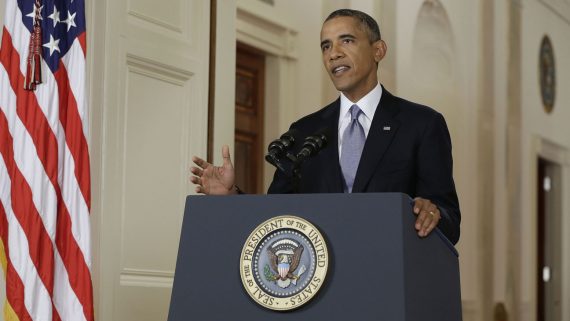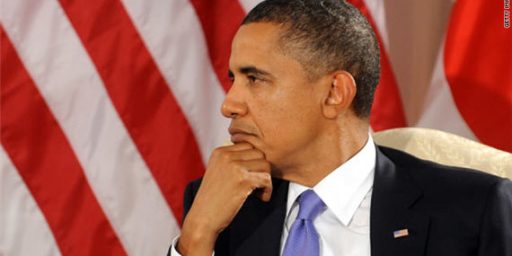Obama Didn’t Try To Scare Americans Over Syria, Except When He Did
:Like his predecessors, President Obama's speech last night exaggerated the threat that Syria poses in order to sell his plan to American voters.
Max Fisher thinks that President Obama deserves credit for not using “scare tactics” to sell the American public on his plans regarding Syria:
There are few more reliable ways to sell Americans on military action than to tell them that they’re in danger. That’s not a dig on Americans; people of all nationalities are naturally self-interested. Perhaps that was a lesson Obama learned in the Iraq War debacle, when the Bush administration’s over-sell of Iraq’s alleged threat made the public easier to convince but also badly distorted the debate in ways that still impact U.S. credibility. It’s still much easier to argue that the United States has to fight the enemy abroad so it doesn’t have to defend against them at home. And, almost 12 years to the day after September 11, 2001, it would have been awfully convenient for Obama to tell Americans that strikes are necessary to prevent terrorism.
But Obama didn’t say any of that, even though the political consequences of threat-inflation have proven low in American politics and the tactic often seems to work. Obama himself has not been afraid to refer to direct threats to national security when defending, for example, drone strikes and NSA surveillance. But in making the case for Syria, not only did he mostly demur from following that time-worn path, he actually — amazingly — went out of his way to argue that Syria is not an immediate national security threat to the United States or even Israel
Fisher goes on to quote this section of Obama’s speech last night:
Other questions involve the dangers of retaliation. We don’t dismiss any threats, but the Assad regime does not have the ability to seriously threaten our military. Any other retaliation they might seek is in line with threats that we face every day. Neither Assad nor his allies have any interest in escalation that would lead to his demise. And our ally, Israel, can defend itself with overwhelming force, as well as the unshakeable support of the United States of America.
Fisher calls that a “remarkable” thing for the President to say at the same time that he’s trying to sell his plan to a skeptical American public, and Andrew Sullivan, who gave the President’s speech rave reviews last night, cites Fisher’s piece approvingly. What’s interesting, though, is in perusing the President’s speech for excerpts that support his argument, Fisher managed to miss others:
When dictators commit atrocities, they depend upon the world to look the other way until those horrifying pictures fade from memory. But these things happened. The facts cannot be denied. The question now is what the United States of America, and the international community, is prepared to do about it. Because what happened to those people — to those children — is not only a violation of international law, it’s also a danger to our security.
Let me explain why. If we fail to act, the Assad regime will see no reason to stop using chemical weapons. As the ban against these weapons erodes, other tyrants will have no reason to think twice about acquiring poison gas, and using them. Over time, our troops would again face the prospect of chemical warfare on the battlefield. And it could be easier for terrorist organizations to obtain these weapons, and to use them to attack civilians.
If fighting spills beyond Syria’s borders, these weapons could threaten allies like Turkey, Jordan, and Israel. And a failure to stand against the use of chemical weapons would weaken prohibitions against other weapons of mass destruction, and embolden Assad’s ally, Iran — which must decide whether to ignore international law by building a nuclear weapon, or to take a more peaceful path.
As James Joyner noted in his fisking of the President’s speech last night, these assertions by the President are either false or an example of the Slippery Slope Fallacy that has long been engaged in by advocates of interventionism, Republican or Democratic, when responding to their critics. First of all, Syria is not a threat to American national security or the security of America’s allies. Not only did the President admit to this in the section of the speech that Fisher cites approvingly, he’s stated it before rather explicitly as have other members of the Administration. And yet here he is in the very same speech that Syria and its chemical weapons are a threat to the United States and our allies. Which one is it Mr. President?
Equally absurd is the idea that how we react to Assad’s use of chemical weapons will impact how North Korea and Iran act relating to their WMD programs. With respect to North Korea, it’s become rather obvious over the years that their military exists as a tool of domestic propaganda and, internationally, for the purpose of engaging in occasional saber rattling designed to either address some internal regime conflict or get some concession from the West. While we most assuredly never let our guard down, it’s rather obvious that the leadership in Pyongyang is well aware of the fact that actual aggression against South Korea, Japan, or U.S. military forces would result in immediate and severe retaliation. As far as Iran goes, the Islamic Republic has been engaging in a nuclear weapons research program for decades now and have resisted efforts to deter them from that path for nearly as long. It’s simply inconceivable that their behavior is going to be all that influenced by how we react to Assad’s use of chemical weapons. Moreover, as I noted last week, it’s simply improper to justify military action against Syria because it would “send a message” to Iran.
All of that aside, though, the fact is that last night the President did exactly what Fisher compliments him for not doing, using slippery slope arguments and outright exaggeration to try to scare the American public into supporting his policy. He exaggerated the non-existent threat that Syria poses to American interests, much in the same way that members of the Bush Administration warned us that we’d see mushroom clouds over American cities if we didn’t deal with Saddam Hussein once and for all. So, what is it that Obama deserves credit for exactly?







If Mitt Romney was President today, the GOP would be calling for Assad´s head on a stick..
So basically your position is the very concept of deterrence is a slippery slope fallacy, and any mention of it is scaremongering on the same scale as the Bush administration’s outright lies about Iraq’s capabilities?
That’s retarded.
We saw two different speeches.
…In the one I saw, Obama asked for some semblance of justice for murdered children.
Why is that our job?
Syria is not a threat to Israel? Really?
@Doug Mataconis:
When this country asserts that they lead the free world, you take on the mantle of justice for murdered children.
“In order for evil to flourish, all that is required is for good men to do nothing.” I contend that applies to “good countries” as well.
@Bob @ Youngstown:
Syria is not a threat to Israel? Really?
It’s funny, they seem to have decided that since Israel would win in a conflict with Syria, the threat from that country does not exist.
Again, retarded.
@Bob @ Youngstown:
Yes, really, as long as we are willing to replenish Israeli war stocks (bombs, beans, bullets, etc) as we have since 1967.
Is Doug’s view of things any more complex than “If Obama does it, it’s wrong?”
Er, why? Syria is Iran’s client. If we don’t show that we are serious about deterring Iran’s client, why should Iran believe that we are serious about deterring them? I think its VERY conceivable that Iran will gauge the USA’s willingness to take action to deter them by what it does in Syria. It’s wishful thinking to imagine otherwise.
@Doug Mataconis:
All that is necessary for the triumph of evil……
@Doug Mataconis:
Because the moral difference between committing an atrocity and idly watching one unfold that you could have stopped is not as great as people like to think.
@Bob @ Youngstown:
Four months ago the UN declared that thousands of children had already been killed in the civil war.
So by your standard we should have intervened long ago. Or is that kind of intervention too painful, too difficult? Does your principle stand only so long as the cost to us is not too high?
@Doug Mataconis:
Why is that our job?
Because most of us don’t want to live in a world where only the strongest survive. Because murdered children are children, and they should be cherished and protected. And because egoism is morally repellent.
@Dave:
Should we have intervened long ago, perhaps we should have. Personally I am adverse to interjecting the US into the Syrian civil war, however that civil conflict should not be immune to the international condemnation of chemical weapons.
@Bob @ Youngstown: So in other words, blah, blah, blah.
before we veer of course we must remember that obama made that dreaded “red line” threat and assad “double dog” dared him to respond- doesn’t matter if we can or even should try to prove that he chem’ed his people. (100k dead later anyway) then kerry stuck his dumazz into the fray and all of the sudden russia and syria are calling all of the shots? wtf are our “leaders” doing anyway- aside from looking like a bad comedy skit?
@bill:
It’s a very good sign Vlady is feeling confident about taking control of the situation, and even gloating.
Indicates he feels he’s got a solid grip on the Syrian CW stocks.
Libertarianism in a nutshell…
I’d say that Putin is in line to get a lot of grief here. He’s the one saying he’ll take care of this Syrian chemical weapons problem, and what’s going to happen when the Syrians don’t comply with what was promised? I think Obama avoided stepping in it, and Putin gets to walk around with a “doggy bag.”